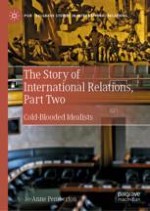2019 | OriginalPaper | Buchkapitel
3. The Hoover Plan, Reparations and the French Constructive Plan
verfasst von : Jo-Anne Pemberton
Erschienen in: The Story of International Relations, Part Two
Aktivieren Sie unsere intelligente Suche, um passende Fachinhalte oder Patente zu finden.
Wählen Sie Textabschnitte aus um mit Künstlicher Intelligenz passenden Patente zu finden. powered by
Markieren Sie Textabschnitte, um KI-gestützt weitere passende Inhalte zu finden. powered by
